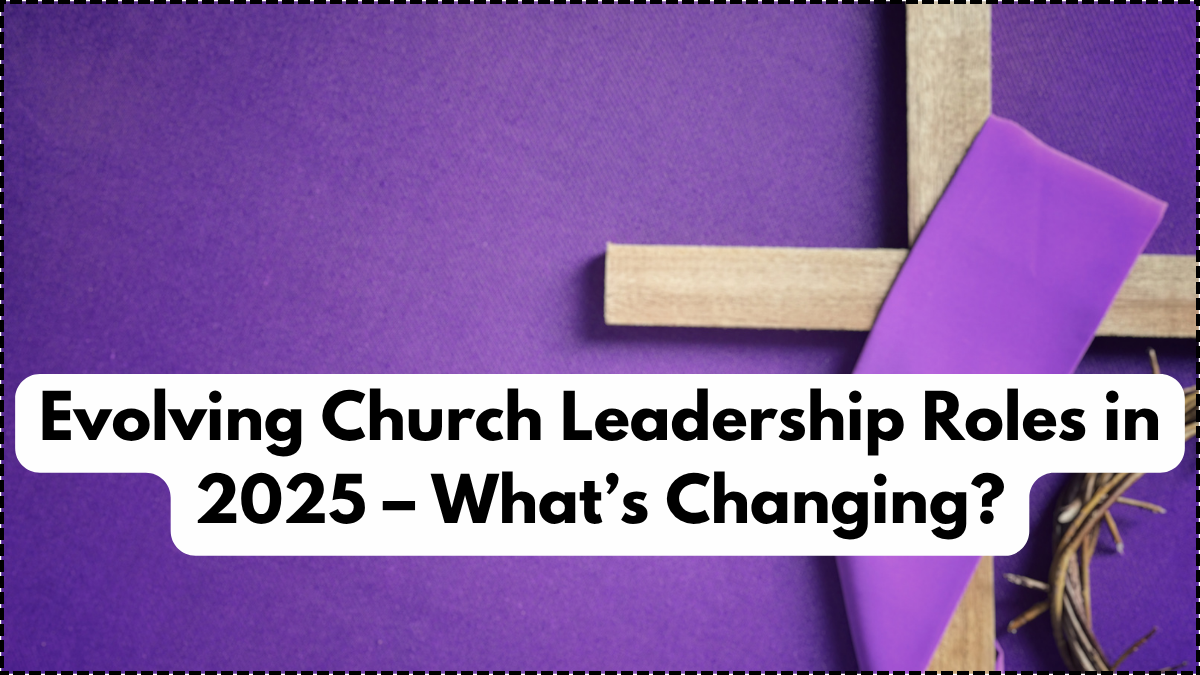Church leadership in 2025 looks significantly different than it did just a few years ago. Shaped by cultural shifts, technological innovation, and post-pandemic adaptations, the traditional roles in ministry are being redefined. From digital discipleship to mental health advocacy, the responsibilities of modern church leaders are expanding—and fast. This article takes a fresh look at how Church Leadership 2025 is being reshaped and what that means for pastoral roles, congregations, and community impact.

The Rise of Specialized Leadership in Modern Ministries
Churches are no longer operating under a one-size-fits-all leadership model. In 2025, faith communities are embracing a team-based approach where pastors are supported by specialists in technology, counseling, social outreach, and administration. The classic image of a pastor doing it all—preaching, counseling, leading worship—is being replaced by collaboration.
For example, many mid-sized churches now employ a digital engagement pastor or content strategist responsible for livestreams, podcasts, and social media. Meanwhile, others have mental wellness coordinators or family life directors, focusing on counseling and multigenerational support. This division of labor ensures that pastoral roles remain sustainable and that leaders avoid burnout.
Table: Evolving Pastoral Roles in 2025
| Role Title | Focus Area | Common in Church Size | New in 2025? |
|---|---|---|---|
| Lead Pastor | Vision, Preaching | All Sizes | No |
| Digital Ministry Director | Online Church Experience | Mid-Large | Yes |
| Care & Wellness Pastor | Mental Health, Grief, Support | Medium-Large | Yes |
| Teaching Pastor | Education, Discipleship | Medium | No |
| Community Engagement Lead | Outreach, Justice, Partnerships | Urban/Inner-City | Yes |
Data-Driven Decision Making is Now the Norm
One of the most transformative developments in Church Leadership 2025 is the use of data to inform decisions. From attendance trends to online engagement stats, church leaders now have access to real-time analytics that help them understand what’s working—and what isn’t.
Software tools like Church Metrics or Planning Center are being widely adopted, giving leaders insight into everything from giving patterns to event participation. Pastoral roles have evolved to include data literacy as a crucial skill. Those unable to interpret digital behavior may struggle to connect with their congregations effectively.
Redefining Authority and Influence in the Church
Gone are the days when title alone carried spiritual authority. In 2025, authenticity and relational leadership carry more weight than hierarchy. Members want leaders who are transparent, accountable, and approachable. Younger generations, in particular, are more likely to follow those who live their faith consistently rather than those who simply hold traditional titles.
This change is prompting churches to move toward flatter leadership structures. Shared leadership models—such as eldership teams or leadership councils—are becoming more common. These structures reduce pressure on individual pastors and reflect a more collaborative, inclusive form of governance.
Training for 2025 and Beyond
Church leadership preparation is catching up with the demands of 2025. Seminaries and training programs now include courses on media literacy, trauma-informed care, and diversity training. There’s also a growing emphasis on entrepreneurial thinking, helping leaders develop sustainability strategies for both financial health and community engagement.
Pastoral roles now require continuous learning. Many leaders attend leadership cohorts, online masterclasses, and mentorship groups to keep up with cultural trends and theological developments. The expectation is no longer that a pastor will have all the answers but that they will know how to navigate change with wisdom and humility.
Conclusion
The evolution of Church Leadership 2025 reflects a church that’s adapting, innovating, and broadening its reach. As pastoral roles diversify and leadership becomes more collaborative, churches are better equipped to meet the needs of a rapidly changing world. These shifts aren’t temporary—they’re shaping the future of faith leadership in profound and lasting ways.
FAQ
What are the biggest changes in church leadership roles in 2025?
In 2025, churches are moving toward team-based leadership, incorporating digital ministry, wellness care, and data-driven decision-making into pastoral roles.
How are pastors being trained differently now?
Pastors are now trained in tech, trauma care, and cultural engagement. Seminaries are expanding their curricula to reflect these new needs.
Why are traditional pastoral roles evolving?
Cultural shifts, technological integration, and post-pandemic realities have made it necessary for church leaders to adapt how they serve and connect with communities.
What skills are now essential for church leaders?
Modern church leaders need skills in communication, digital tools, mental health support, and team management in addition to traditional theological training.
Will these leadership trends continue?
Yes, the trends seen in 2025 are expected to deepen as churches strive to remain relevant and responsive to their communities.
Click here to know more